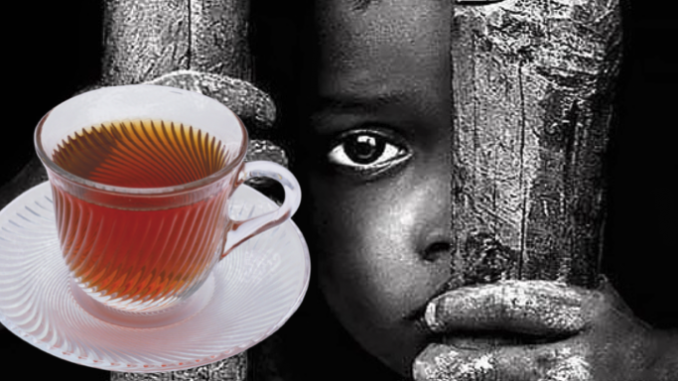
Is your cup of tea contributing to modern-day slavery? It very well may be. Author Liz Dwyer explains in a fascinating, if not horrifying, article from TakePart.com:
Crumbling buildings, raw sewage near living quarters, widespread malnutrition, and child slaves—those probably aren’t the things you think about while sipping a steaming cup of tea. The beverage can bring a moment’s peace in an otherwise stressful day—and for folks in the U.K., drinking a cuppa is a national pastime. But for many of the workers who pick tea leaves in Assam, a region in the northeast of India, harvesting the plants has become a nightmare.
As seen in the video above from BBC News, at Doomur Dullung, one of the region’s enormous plantations, which grows tea for major brands such as Lipton, PG Tips, Tetley, and Twinings, living and working conditions are horrific. As a result of the investigation, jet-set-friendly department store Harrods has pulled some tea products from its shelves, and Rainforest Alliance, an NGO that certifies tea as having been produced ethically, has admitted that its system isn’t working as it should, reported BBC News.

BYPASS THE CENSORS
Sign up to get unfiltered news delivered straight to your inbox.
You can unsubscribe any time. By subscribing you agree to our Terms of Use
At one point, shocking footage of a child—with the face blurred out—picking tea is captured on camera. Assam Company told BBC News that allegations of child slavery are “baseless and false.” However, traffickers are known to sell children as young as 12 for enslavement on tea plantations.
As many as 100,000 girls are thought to be enslaved in India, many of them on tea plantations. “The owners of these international tea estates don’t care for these people. They don’t pay them minimum wages. Forget about the decent wages: they don’t even pay survival wages,” Nobel Peace Prize winner Kailash Satyarthi, founder of the child rescue organization Bachpan Bachao Andolan, told The Guardian last year. “The reality is slavery, the reality is abuse, the reality is sexual exploitation, the reality is endless slavery.”
In the video, Justin Rowlatt, BBC News’ South Asia correspondent, also turns the spotlight on the substandard housing and worker-safety violations on estates.
“Tea plantation owners in India are obliged by law to provide adequate houses and sanitary toilets for workers,” explains Rowlatt at the start of the clip. Then he takes us to the hut of a woman who hasn’t had a functioning toilet in 36 years. She tells how, for years, she’s asked for repairs to be made, but the management of the estate hasn’t done anything. “She told us she has no choice but to go in the tea bushes,” says Rowlatt.
Her situation isn’t an isolated one. A manager from McLeod Russel, the world’s biggest tea producer, admits on camera that there is “a huge backlog of repairs” and tells Rowlatt there are only 464 toilets for 740 homes.
“Let me be clear,” Sandip Ghosh, head of the Assam branch of the Indian Tea Association, told BBC News, “cesspools and open defecation are not acceptable to me or the association. These issues need to be addressed.”

